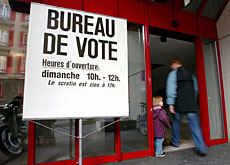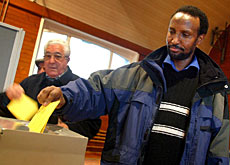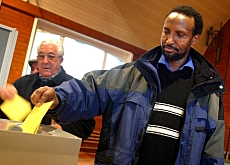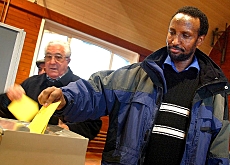Foreigners to flex voting muscle in Geneva

Around 75,000 foreigners living in canton Geneva have the chance to vote in a local election for the first time on Sunday.
The decision to grant the vote to foreigners who have lived in Switzerland for at least eight years has swelled the canton’s electorate – at a local level – by more than a third to 290,000.
Geneva’s huge non-Swiss population won the right to vote in a historic ballot in April last year. Foreigners make up almost 40 per cent of the canton’s 445,000 residents – compared with 20 per cent for all of Switzerland.
The “J’y vis, J’y vote” (“I live there, I vote there”) initiative, which also gives them the right to launch and sign popular initiatives and referendums, was backed by a slim majority of the electorate. A separate proposal that would have allowed foreigners to stand at local elections was rejected.
“Our national identity is not the same as it was 50 years ago and the change means we need to integrate foreigners more easily,” Guy Mettan, a backer of both initiatives, told swissinfo.
“The idea of giving the right to vote after eight years is a way of integrating them into the Swiss political system.”
Mettan, who leads the centre-right Christian Democrats in the cantonal parliament, added that foreigners who “paid taxes, sent their children to school and participated in the economic development of the country” had earned the right to vote.
Right to vote
Elections are taking place in each of the canton’s 45 communes, with more than 1,700 candidates standing for 896 seats.
The canton’s electoral office sent out an information brochure to eligible foreign voters last year notifying them of their right to vote. They were also invited to attend information evenings in their commune.
The estimated 35,000 people working for international organisations in the canton, such as the United Nations, have had to apply to the cantonal authorities to be registered to vote.
Patrick Ascheri, head of Geneva’s electoral office, said it was difficult to say how many new voters would head to the polling station on Sunday.
“As it’s a first for Geneva we have nothing to compare it with,” he pointed out. “But that being said, the first election [involving foreigners] in canton Vaud saw participation of around 20 per cent.”
Most parties have been quick to embrace the new electorate. Carole-Anne Kast, coordinator for the centre-left Social Democrats, said leaflets in eight languages had been distributed at campaign stands in communes across the canton.
Guy Mettan said the Christian Democrats had invited foreign voters to “spaghetti parties”, hoping to get their message across over a bowl of pasta.
Political landscape
Mettan said it was difficult to say whether foreign voters had the potential to change the political landscape in Geneva, especially since at this stage no one knew whether they would lean right or left – or even come out to vote.
The rightwing Swiss People’s Party, which campaigned against giving foreigners the vote, said it had not made a special effort to tap into this new seam of voters.
“The party has done nothing,” said Eric Bertinat, a member of the cantonal parliament. “We believe that since foreigners now have the vote in Switzerland, we should treat them as Swiss.”
Gillian, 61, who did not wish to give her full name, is one of those voting for the first time in Geneva – and indeed for the first time in her entire life. She left Britain for Switzerland before she was old enough to vote and has never cast a ballot.
She says the hardest thing is working out whom to vote for. In her commune of Meyrin, there are more than 80 candidates standing for 31 seats.
“I never really followed local politics before because I’ve never been able to vote. But I think that as they’ve pushed for foreigners to vote, we should do so. The question is who for?”
swissinfo, Adam Beaumont in Geneva
Municipal councillors are elected for a four-year period and their number is proportional to the number of residents residing in the commune. Nine seats are up for grabs in Gy; 80 in the city of Geneva.
Municipal councils can take decisions on budgetary, land and construction matters but cannot amend cantonal or federal law.
Geneva communes with less than 800 residents elect councillors by a simple majority – there are six of them. The other 39 use a system of proportional representation.
More than 38,000 foreigners living in the communes of the city of Geneva, Chancy and Lancy have already had a taste of the polling experience, voting on local issues in October last year.
Foreigners who have been resident for a certain number of years are entitled to vote in local elections in cantons Neuchâtel, Jura, Fribourg, Vaud and Geneva.
In Neuchâtel and Jura they can also vote on cantonal issues.
In Jura, Fribourg and Vaud foreigners can stand in local elections.
The situation is very different in German-speaking Switzerland.
Only a handful of communes in Appenzell Outer Rhodes and Graubünden allow foreigners to vote.

In compliance with the JTI standards
More: SWI swissinfo.ch certified by the Journalism Trust Initiative



You can find an overview of ongoing debates with our journalists here. Please join us!
If you want to start a conversation about a topic raised in this article or want to report factual errors, email us at english@swissinfo.ch.